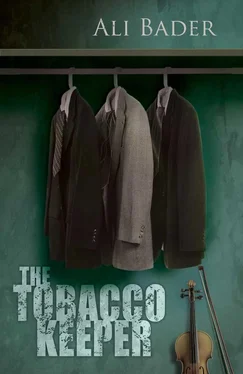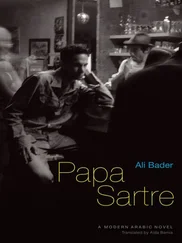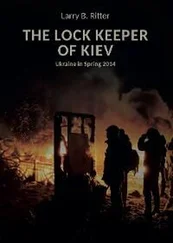When Yousef returned to his apartment in a small suburb of Moscow, there were piles of snow on the pavement. He felt the cold breeze hit him in the face as he turned the key in the lock. He was utterly exhausted. Taking off his heavy coat, he threw it on the sofa and sat on the black leather chair, stretched his legs onto the table opposite. In no time at all he fell into a long nap from which he was woken by the ringing of the telephone. He looked at his watch and discovered it was very late. Kakeh Hameh’s voice came over the line, inviting him to meet up again at the Novoslobodskaya train station, which was near the house.
Yousef got dressed in a hurry and went to the great station. He heard the harsh, grating sounds of the brakes as the trains ground to a halt. The passengers got off. Kakeh Hameh was waiting for him at the telephone booth, with a Russian musician called Sergey Oistrakh, who was wearing a black hat and was standing with his wife, a tall, blonde woman. Oistrakh spoke only Russian, so Kakeh Hameh translated. To the ringing of the station bell, the four of them walked through the crowds and arrived at a wooden house nearby. It had an iron gate and was surrounded by linden trees. Kakeh Hameh talked to Yousef for a long time and gave him a lot of information about getting to Tehran. He then gave him a fake passport in the name of Haidar Salman, musician. He told him to stay for a while in Tehran and then move to Baghdad.
Two hours later, they headed for the Sheremetyevo airport on the outskirts of Moscow. In the evening Yousef boarded a plane bound for Prague. A Czech musician called Karl Baruch collected him from the airport and took him to a place outside Prague. In an isolated wooden house in a vast forest near the city of Mladá Boleslav, they sat together and chatted about music for a long time. Yousef thoroughly enjoyed talking to him, for Karl Baruch was a young man in his twenties, like him. He had blond hair and blue eyes. He wore a white coat and carried a leather briefcase. He gave Yousef a beautiful violin as a present, which he hugged in an expression of his gratitude. Yousef didn’t sleep all night long. Every time he opened his eyes and caught sight of the violin, he smiled and tried once more to sleep.
In the morning, Yousef went straight to the Iranian embassy in Prague. As soon as he had obtained an entry visa to the country, he booked a flight on a Norwegian plane bound for the Iranian capital, Tehran. Did the composer feel that he had left the personality of Yousef Sami Saleh on the seat behind him and acquired a new one? In one of his letters he mentioned that it was on that day that he heard from Karl Baruch about Tobacco Shop . Did he realize that his new persona would be that of the protected man?
VII The protected man in the tobacconist’s
From the life of Haidar Salman (1924-81)
‘Don’t plan your destiny, for you have no future. Between a glass you drain and a glass you fill, who knows whether your destiny lies in the middle of the abyss!’
‘Odes de Ricardo Reis’, Tobacco Shop
An immigrant, an obscure composer and ideological gangs
The second character in Fernando Pessoa’s poetry collection Tobacco Shop is the poet Ricardo Reis, who is protected by the first character, Alberto Caeiro. He has a date of birth and lifestyle very different from the other two. This protected character believes in the Greek gods even though he lives as a Christian in Europe. He feels that his spiritual life is fixed and constant, and that real happiness is impossible to achieve. He also believes in fate and destiny, and in the existence of an overarching power which, despite everything, ignores his freedom.
All these ideas lead the character of the protected man towards a kind of Epicurean existence and compel him to avoid pain at any cost. In spite of his wisdom, the protected man tries as best he can to avoid emotional endings. He tries to look at life from a certain distance and accept his fate with equanimity, looking philosophically at identities and casting doubt on everything and everyone, including himself.
This character has close affinities with the second persona assumed by the composer, that of Haidar Salman. After his escape from Israel to Moscow, he immigrated to Tehran with the help of the Russian musician Sergei Oistrakh and the Iraqi communist Kakeh Hameh, who lived in Moscow. The fake passport he carried gave him more than just a new name. It gave him a new history and a date of birth that preceded that of the first character by two years. In other words, he was now born in Al-Kazemeya in Baghdad in 1924, just as the character of the protected man in Tobacco Shop was born nine months before the first character. And he was a Shia.
When Yousef Sami Saleh sat with Kakeh Hameh in Moscow, the latter gave him a great deal of information that would help him become familiar with his new personality as Haidar Salman. The son of a merchant at Al-Isterbadi market in Al-Kazemeya, Salman had angered his family by studying music in Moscow instead of medicine. That was the reason he was unable to return to Baghdad at that time. He wanted to travel to Iran to visit an Iraqi merchant called Ismail al-Tabtabaei. The latter was a real not fictitious person, a wealthy merchant who traded between Tehran and Baghdad and was known for his great sympathy for the left. The history of this second persona was clearly very different from that of the first. Yousef Sami Saleh was naturally required to impersonate and embody this new persona, which was fairly similar to that of Ricardo Reis in Tobacco Shop . Reis was a protected young man from a wealthy, influential family, the son of a very rich merchant, as well as a musician and a rebel. Both Ricardo Reis and Haidar Salman were spontaneous, self-indulgent high-achievers. They enjoyed wealth and the simple pleasures of life, and tried to avoid emotional endings.
All the evidence confirms that Haidar Salman arrived in Tehran early in the winter of 1953, that is, a few months after the overthrow of the Mossadegh government. In this Eastern city the composer embarked on a totally new phase of life and with a very different personal history. He arrived at Tehran’s Mehrabad Airport with a small, black suitcase containing a few items of clothing. These were, with the exception of a black scarf and a pair of leather gloves that he’d bought at a small shop in Moscow, the same items that he’d carried with him from Iraq. All he had in his pockets were a few tomans that had been given to him by Kakeh Hameh, his passport and his gloves. He carried the violin that the Czech musician Karl Baruch had given him as a gift. [ Karl Baruch later became the best-known violinist in Czechoslovakia, and received numerous prizes and accolades. He fled to the United States in 1975 and died in New York in 1983. ] Kakeh Hameh had given him the address of Ismail al-Tabtabaei [a well known Iraqi merchant who was a friend of the Communist Party and had spent many years between Tehran and Baghdad]. Hameh also gave him a book to teach himself Persian in seven days. As he presented him the book, he cautioned: ‘Don’t believe the seven-day thing, though!’
At dawn on 13 December 1953 the plane landed at Mehrabad Airport. When Haidar Salman disembarked, he felt the cold, sharp air strike his face. Snow had been falling and the airport was brilliant white. He walked unsteadily towards the passport control officer. When he stood before him his smile was full of fear. He handed over his Iraqi passport.
The Iranian officer, a captain by rank, asked him to sit on a wooden bench near the passport booth. Without looking at the passport, he placed it to one side and began to stamp the passports of the other passengers, one after the other, until Haidar was the only person left. The young officer then picked up Haidar’s passport and flipped through its pages carefully and attentively while talking to several people on the phone. Haidar was extremely anxious and confused, unable to overcome his anxiety and doubts that the passport officer might discover the passport was fake, in which case his whole life would be in serious danger. Haidar sat on the wooden bench reflecting on his fate, realizing that both his return and his love of music were totally incomprehensible to others. He belonged to a different world from the real one and had a vocation that was alien to his environment. To alleviate the worries and sorrows that had taken hold of him, he started gazing around the airport hall and up at the ceiling. He waited for the official procedures to end, not knowing what to expect either now or later. He looked anxiously through the window and saw some high trees, the sky overcast with clouds and an empty carriage pulled by a pair of horses. When he looked up at the airport ceiling, he saw the Nazi swastika decorating its centre. He later wrote to Farida about this: ‘The airport and the central railway station in Tehran were built in the thirties by Nazi Germany, when there were close relations between Hitler and Reza Shah, Iran’s former ruler. The ceiling was constructed in such a way as to make it impossible for the swastika to be removed without the whole thing collapsing.’
Читать дальше












